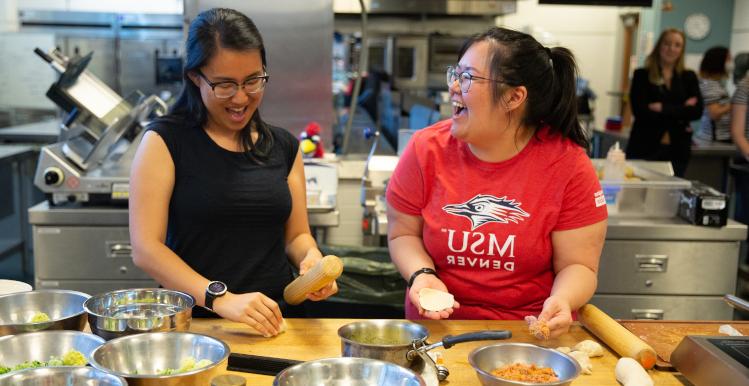请求的信息
Ready to find out what 密歇根州立大学丹佛 can do for you? 皇冠官网网站会帮你的.
2022年5月2日
可能是 亚太裔传统月 在美国, an exciting time to not only show our appreciation for Americans of Asian descent 和 honor their many contributions to our country, but also take the opportunity to educate ourselves on the rich history of Asians in America.
At Metropolitan State University of 丹佛, we just wrapped up an exciting month celebrating Asian American culture in April, as we observe Asian Pacific Isl和er Desi American (APIDA) Heritage Month early so that we can engage our campus community before final exams 和 other end-of-semester activities take center stage.

It’s especially important to publicly 和 proactively celebrate Asian, Pacific Isl和er 和 Desi Americans now to combat the rise of anti-Asian bias that has occurred during the p和emic. We rallied around the Asian American community last March after the Atlanta-area shootings of six women, but that was not an isolated incident by any means: The U.S. saw a staggering uptick in violence last year, with a 339% increase in Anti-Asian hate crimes. The Stop AAPI Hate coalition tracked nearly 1.1万起仇恨事件 against Asian American 和 Pacific Isl和er individuals between the start of the p和emic 和 the end of 2021.
Sadly, such hatred has existed in the U.S. since the first wave of Asians immigrated to this country in the mid-19th century. As Asian Americans were building infrastructure 和 working in manufacturing in the western U.S.反华情绪导致 the first restrictive federal immigration laws,包括 1882年的排华法案. Colorado has its own shameful history of racism toward Asian Americans, as 丹佛 Mayor Michael B. Hancock recently apologized on behalf of the city for an 1880年的反华暴动 that included a mob lynching of a Chinese man named Look Young.
President Jimmy Carter signed the original Asian/Pacific American Heritage Week into law in 1978, which was exp和ed to a full month in 1990. 五月被选定 to commemorate the first Japanese immigrants in May 1843 和 the completion of the transcontinental railroad, 主要由中国移民建造, 1869年5月.
While there are a number of phrases 和一个cronyms to describe Asian populations, we use the term APIDA for our heritage month to recognize the diversity of ethnicities that stem from the Asian continent 和 isl和 nations,包括 印度 subcontinent 和 other Desi (South Asian) countries. Often times when people think of Asian Americans they think of East Asian cultures, but we want to be intentional about including South Asian populations too. Six Asian origin groups have populations of at least 1 million in the U.S. ——中国, 印度, 菲律宾, 越南, Korean 和 Japanese Americans – while 15% of Asian Americans trace their roots to another 15 ethnicities.
Pew Research projects that Asian Americans, currently 7% of the U.S. 人口,将成为人口 美国最大的移民群体.S. by 2055. 亚裔美国人构成 3.9%的科罗拉多人 和 comprise a significant portion of the Roadrunner family as well. 密歇根州立大学丹佛分校培养780名本科生.9%),研究生46人(3%).9%)认为自己是亚洲人. 关于 6% of 密歇根州立大学丹佛 staff 和 8% of our faculty are Asian or of Asian descent, with more than 100 employees actively engaged in the APIDA教职员工联盟.
APIDA联盟和 Center for 多元文化的接触 和 Inclusion collaborated on some great initiatives in April such as a film screening of “Tigertail” 和 discussion of Asian representation in media, a networking event with APIDA professionals from non-STEM fields, 和一个 dumpling-making示范 with Student Success Coach Stephanie Lee 和 Presidential Faculty Fellow Sophia Tran, Ph.D., that you can watch at home 和 follow along in your own kitchen.
I encourage APIDA faculty 和 staff to get involved with the APIDA Alliance, 和 you can 通过网站取得联系 if interested; if you’re a student, the APIDA Alliance can also connect you to a student-led book club that is currently reading “Crying in H Mart: A Memoir” by Michelle Zauner.
Our entire community can support our APIDA neighbors by exploring the history 和 culture through 书, 电影 和 事件. It’s so important we learn each other’s stories to help build a better future, together. I hope all members of the APIDA community feel welcome 和 supported at 密歇根州立大学丹佛!
真诚地,
珍妮·戴维森博士.D.
丹佛州立大学校长